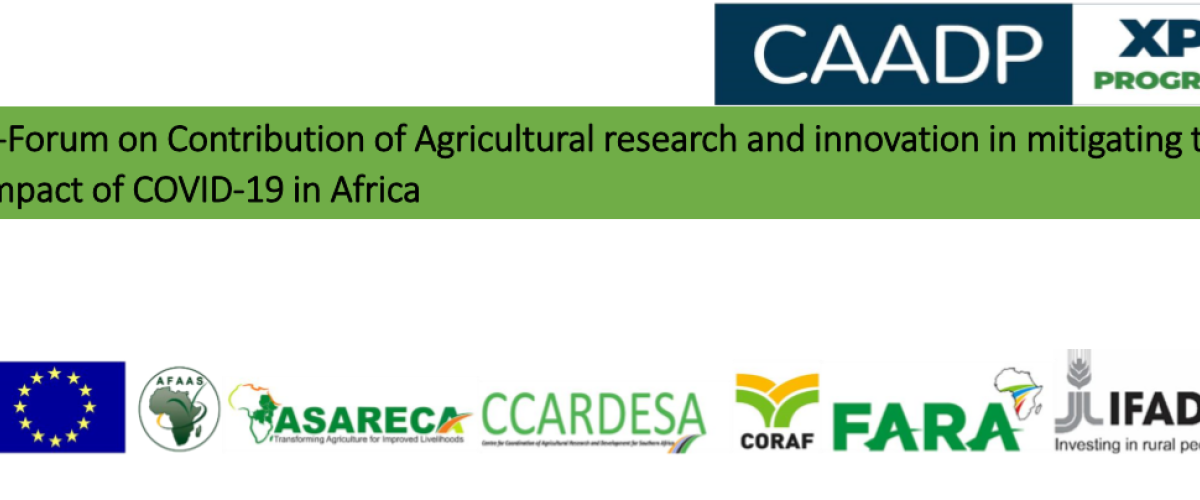
"In the midst of every crisis, lies great opportunity" were the resounding words of Albert Einstein which were quoted by Her Excellency Josepha Leonel Correta Sacko, the Commissioner, African Union Commission Department of Rural Economy and Agriculture during her opening remarks at the e-forum on the contribution of agriculture research and innovation in mitigating the impact of COVID19 in Africa held on 20th May 2020. She stressed that the COVID19 had created an opportunity for Africa to explore contextualized solutions that will be relevant to the continent. “This is the best time to boost Africa’s food security. It presents us with a crisis within a crisis. The science and technology and innovation are a critical agenda now than ever before” she added to underscore the role of science in finding solutions to the current crises of climate change and COVID-19 which are likely to impact Africa’s food security.
The CAADP-XP4 implementing organizations which include the Forum for Agricultural Research in Africa (FARA), the Centre for Coordination of Agriculture Research and Development in Southern Africa (CCARDESA), African Forum for Agricultural Advisory Services (AFAAS), West and Central African Council for Agricultural Research and Development(CORAF), Association for Strengthening Agricultural Research in Eastern and Central Africa(ASARECA) convened the meeting.
The purpose of the meeting was to elicit perspectives and secure buy-in of stakeholders in the continent’s agriculture science, technology and innovation (STI) regarding:
- COVID-19 impacts (short term, medium, and long-term whose solutions are principally rooted in research and innovations.
- Identification of priority interventions to be undertaken by African ‘research and innovation system and
- The next steps in advancing from concept to action.
Dr Idrahim Mayaki, the Chief Executive Officer at Africa Union Development Agency (AUDA)-NEPAD said the COVID-19 was a local problem which required a contextualized solution. He advised against shelving local research findings and opting for external results which did not solve the problem. He encouraged the participants not to push forward other people’s agenda but instead to push the African agenda so that the continent becomes self-reliant.
Speaking at the same event, Dr Malu Ndavi, the Technical lead specialist and the Task Team Leader (TTL) of the CAAPDXP4 Programme from IFAD acknowledged and applauded the partnership of FARA, CCARDESA, AFAAS, CORAF AND ASARECA in implementing the CAADP-XP4 Programme. He mentioned that COVID-19 is here to stay and is the new normal. Therefore, people must find ways and interventions of living with it. He stated his desire to see the meeting coming up with specific interventions in agriculture and have a clear roadmap that will address the short time shocks imposed on the people, markets and farm produce. He also suggested long term solutions centered around building resilience and disease coping mechanisms in the communities. Dr Ndavi unveiled IFAD’s established response to the COVID-19 for the youths and also applauded CCARDESA and ASARECA for proactively submitting a proposal in response to mitigating COVID 19.
The Executive Director for FARA, Dr Yemi Akinbamijo, gave highlights of the proposal that was developed by all the Sub-regional organizations and how they intend to cushion the effects of COVID-19.
A farmer’s representatives, Elizabeth Nsimadala, who is also the president for the Pan African Farmers Organisation (PAFO), also shared the challenges experienced by the farmers. The double crisis of COVID-19, floods as well as lack of farming inputs which could not be delivered at the onset of the farming season due to travel restrictions that were imposed as a result of COVID17 have affected us” said Ms Nsimadala. She advocated for a need for improved synergies between extension, research and farmer. She also appealed for formation of digital platforms where farmers can aggregate, share and influence data and also appealed for access to post-loss harvest funds and other catastrophes so that farmers can recover from unforeseen disruptions. For Elizabeth, the pandemic has prompted her to think of how Africa can move research from the lab to the farm in order to secure food security for the continent.
The panelists were drawn from all over the continent with over 200 participants listening in. After the webinar session, the discussions were expected to be continued in a blog that will run up to 2nd June 2020. Some of the questions not addressed in the webinar will be addressed in the blog forum. Based on the contributions, what remains to be done is to distil the submitted inputs to develop a complete and detailed road map that the sub-Regional organizations and continental organizations will follow to fully address the impact of the COVID-19 on the agricultural and research sector.





